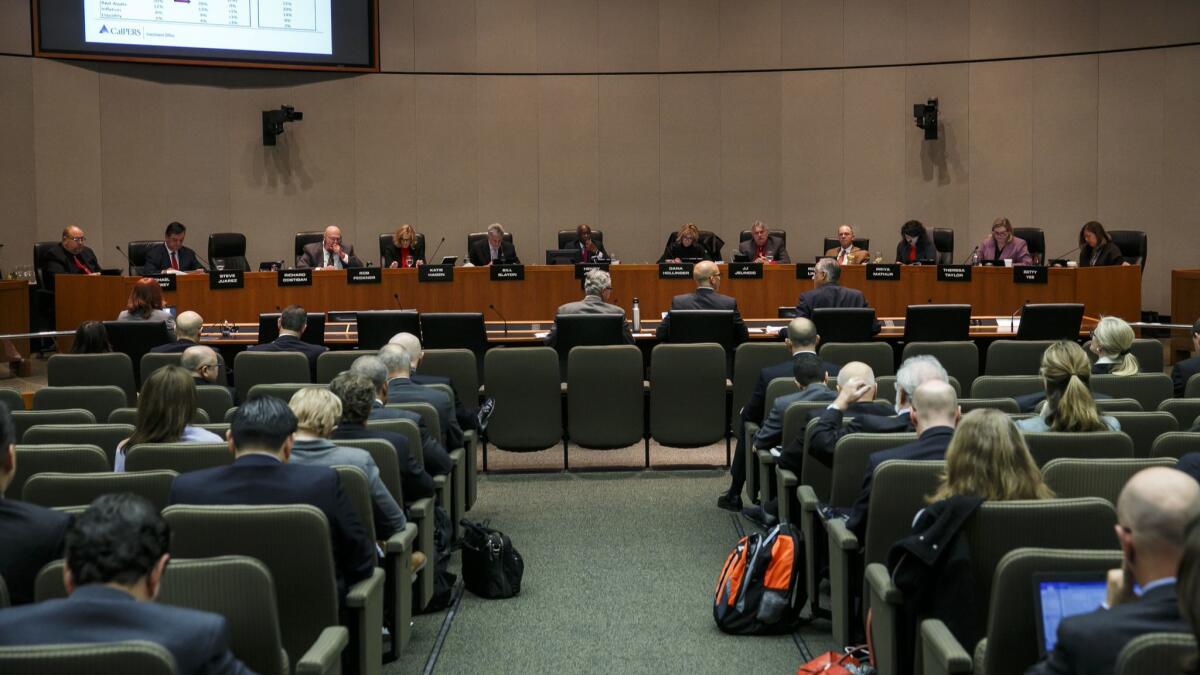Op-Ed: Why is CalPERS still a top investor in Russia’s sovereign debt?

- Share via
These are grim days in Moscow. Sanctions imposed by the Trump administration continue to tighten the vice on the Russian economy. Foreign capital is fleeing the country, increasing its economic isolation.
But there remains a major source of funding upon which the Kremlin can still reliably depend: California state workers and retirees.
The retirement savings of nearly 2 million current and former California firefighters, police officers and state employees are hard at work — in Moscow. As of the end of June, the California Public Employees’ Retirement System, or CalPERS, held $460 million in Russian government bonds, according to data provided to Bloomberg News.
Since purchases of Russian government bonds are effectively loans to Vladimir Putin’s government, this means CalPERS has extended nearly half a billion dollars to a regime that sought to hack our election system in 2016 and is still attempting to undermine American democracy and the U.S.-led Western alliance.
The retirement savings of nearly 2 million current and former California firefighters, police officers and state employees are hard at work — in Moscow.
If that isn’t bad enough, there’s also reason to believe it’s a risky investment. Relations between the two countries could very well get worse. If U.S. sanctions against Russia are extended to debt, as two bills before the Senate propose, the bonds would lose significant value and CalPERS would see a steep loss.
It would be one thing if CalPERS were trying to unwind its position in Russian government debt. Foreign investors have unloaded about $7 billion worth of Russian sovereign bonds since April because of the threat of sanctions and mounting tensions between the United States and Russia. Not CalPERS. The California pension giant has increased its holdings in Russian debt by 8% since last year, Bloomberg reported.
It’s easy to see why ruble-denominated bonds are so attractive to the money managers at California’s giant pension. These bonds, known as OFZs, yield 7% or more, a rarity in today’s low-yield environment.
But there’s a good reason why many investors steer clear of Russian debt. It turns out that some of the dollars loaned to the Russian Treasury are used to recapitalize the heavily sanctioned banking sector, or they wind up, through an opaque process, back in the accounts of sanctioned Russian companies.
In 2016, the Obama administration tried to warn U.S. banks not to take part in a potentially lucrative Russian bond deal because it would undermine sanctions, according to the Wall Street Journal. Also, Russian government bonds figured in a $234-billion money-laundering scandal at Danske Bank.
The bottom line is that CalPERS either doesn’t know or doesn’t care what the Kremlin does with California retirees’ money.
Critics are quick to point out that CalPERS’ holdings of Russian debt are a minute fraction of the $326-billion pension fund’s investments. But those holdings matter very much to Moscow, where the size of California’s stake in Russian debt generated a flurry of news coverage last week.
“Surprisingly, the State of California has entered the top 10 of foreign holders of Russian debt obligations,” the Moscow-based website pravda.ru noted. Topping the list was BlackRock Inc., the giant New York money manager that advises CalPERS, with $2.5 billion worth of Russian debt.
There’s more at risk than just the reputation of the state’s pension giant. Two bills pending before the Senate — including one that South Carolina Sen. Lindsey Graham calls the “sanctions bill from hell” — would bar purchases of new issues of Russian sovereign debt in the United States. Enacting this so-called nuclear option could make all Russian debt radioactive to investors. Bond prices would plummet, leaving CalPERS with a large loss.
By contrast, CalSTRS, the giant state teachers’ retirement fund, appears to be far more leery about lending money to the Kremlin. It holds about $9.5 million in Russian bonds. To some, any amount lent by a U.S. public pension fund to the Kremlin is too much.
Enter the Fray: First takes on the news of the minute from L.A. Times Opinion »
“I can think of no credible reason why U.S. public pension funds and savings vehicles should fund a government that is actively violating our sovereignty,” Daleep Singh, a former U.S. Treasury official who helped draft sanctions on Russia, said last month in testimony before the Senate Banking Committee.
State and local employees need not sit idly by while their money goes to work in Russia. They have a say in how the retirement savings they earned over decades of public service are invested.
CalPERS generally resists divestment, although both it and CalSTRS divested years ago from tobacco. More recently, the California teachers’ fund divested from firearms. If CalPERS won’t divest from Russia, the California legislature can force it to do so, as it did in the case of companies doing business with Iran and Sudan.
Former educators, police officers, firefighters, municipal workers and state employees should let it be known that their retirement dollars can’t be used to bankroll a regime that continues to sow division and unrest in America.
Seth Hettena is a freelance investigative reporter based in San Diego and the author of “Trump/Russia: A Definitive History.”
Follow the Opinion section on Twitter @latimesopinion or Facebook
More to Read
A cure for the common opinion
Get thought-provoking perspectives with our weekly newsletter.
You may occasionally receive promotional content from the Los Angeles Times.









